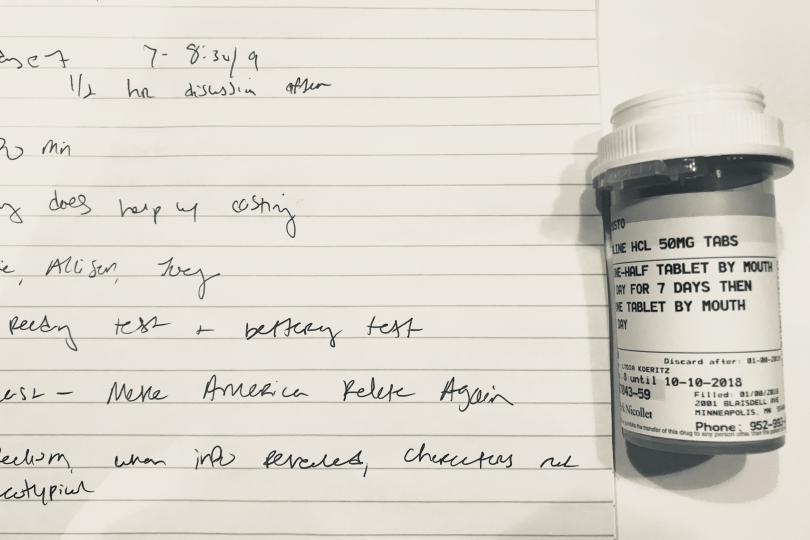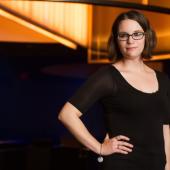Anxiety in the Arts, Part I

When discussing anxiety and mental health, it’s difficult for me to know where to start. I feel the need to explain when I knew I had anxiety (my entire life, but also, only a few years ago when I actually acknowledged it), to explain what anxiety is as we throw the word around a lot, to confirm that this is a valid mental illness that I experience.
Ackknowledgement
For most of my life, I refused to acknowledge that I had generalized anxiety disorder. As a child, I brushed it away as being shy. In high school, I decided I was socially inept and didn’t allow myself to describe myself as anxious because of a friend I had at the time who had intense panic attacks and took full ownership of the word and disorder. In college, I attributed my concerns to psychology student syndrome (the idea that students who study certain psychological disorders begin to see those symptoms in themselves). It wasn’t until my first full-time job after college when I started recognizing my fits of crying, anger, inability to breathe, and other instances where I lost control and would be told by others to “calm down” as panic attacks and went to therapy to learn how to manage anxiety.
Anxiety affects all aspects of my life - in the workplace, in interpersonal relationships, in my ability to sleep and relax, in what I eat and how and when. Anxiety has made it difficult to sustain friendships, handle break-ups, deal with life stress, and has even lost me a job. It has become so much a part of my day-to-day existence, the way I think and act and react, that it is only when I talk with others or consider how others go about their day to day life, I see how my mindset is not typical.
Art Reflecting (Relieving) Life
It’s been through my work as an artist that’s made me most aware of my anxiety. In creating characters in my writing, I’ve begun to see how they channel my anxiety and express a certain “us against the world” mindset I’ve had throughout my life. Through acting exercises that focus on relaxation and the body, I realize the amount of stress I hold in my body. While being in the rehearsal room, I’ve learned to see how my need for perfection and overachiever status refuses to let me stop working when I’m part of a show. Through attending performances, I’ve seen how certain things trigger me towards panic or rouse up my anxiety’s ugly companion, depression. And through working box office, I’ve seen how stress builds and builds through certain encounters and how a customer’s choice of words affects me deeply. Finally, after taking an improv class and having to drop out of it because of how it affected my anxiety, I decided it was finally time to get some serious professional help and stop trying to manage this on my own.
Theater has been both a balm and a bane for my anxiety.
Because I work with people and communicate with people, it has made me more aware of my mental state. I’ve become more reflective and focused on self-care. I also have made new friendships and relationships that have given me more reason to seek help and surrounded me with support and love.
On the other hand, theater has made coping with anxiety a great deal more difficult. There are bubbles of theater where workaholic culture thrives and being sick is not an option. Stella Adler told her students that acting was not a place for broken people, that they could never get sick, and needed complete control over their bodies.
Mental illness doesn’t allow you to have complete control and ideas like this, regardless if we are actors or not, and that makes it feel at times that theater is not the place for someone like me. There’s also the common idea that you need to suffer for your art, that pain builds experience, that Van Gogh would not have painted as he did if he hadn’t been (presumably) bipolar or that Sylvia Plath would never have written the way she did if she wasn’t depressed. This makes it easy to romanticize mental illness and think it’s a necessary part of art, rather than a crutch. It was only when I began to see how anxiety prevented me from making art and doing things I really wanted to do that it was far more of a hindrance than a help to creativity. No one should ever have to suffer in order to create.
A Culture that Contributes
Our culture in general makes it difficult for me. Our political climate and the poisonous, violent, vitriolic atmosphere it creates makes my anxiety far more difficult to manage. The day after the election in 2016, I felt a feeling of panic that has stayed with me for the whole following year and continues to build.
Aside from this, we live in a culture of workaholic, 24/7 nonstop action where we have limited sick days, mental health days are not widely accepted, and many workplaces refuse to let us entirely disconnect from email or phones. Added to this is the American ideal of “pulling yourself up by your own bootstraps,” that we need to tackle things alone and individually, which makes it hard to ask for help or to get help when we need it.
On any given day, I worry about something. Whether it’s paying the bills, meeting a writing deadline, whether someone’s going to cut me out of their life, or the general feeling of dread that hangs about my head (wonderfully described in this Button Poetry piece as being a haunted house). I got really good at thinking this was normal and that this was just how my personality worked. In some ways, I’ll always be a bit of a worrier, but the worry that I feel constantly that makes my heartbeat at a continually elevated rate and makes social events exhausting is something I need and want to control.
I started Zoloft in October of 2017 and, despite my resistance to go on prescription drugs and the reactions I received from people around me, it’s one of the best choices I’ve made and something I needed to do long ago. Medication isn’t a cure, but it has helped me handle stress better, relax more, and worry less (or at least better recognize my irrational worries and let them go).
In some ways, dealing with anxiety has been like my coming out as bisexual - it’s a process. I had to recognize it in myself, talk to others about it, and continually renegotiate how I view myself and that part of my identity. Unlike being bisexual, where coming out allowed me to feel freer and more alive, acknowledging anxiety has made me feel more afraid and limited.
Mental illness still carries a great deal of stigma and part of me feels that I am not the right person to talk about it. I have made a great deal of mistakes because I was in pain and not handling my anxiety well. I have become obsessive, jealous, furious, and somewhat violent. At the same time, I feel that I have not suffered enough - in my mind, there’s still the former high school friend who had panic attacks in class who defined anxiety and never allowed anyone else to acknowledge they might have had the same experiences as her.
On top of all this is my continual struggle with imposter syndrome in which I don’t feel like I belong or feel like a fraud. Anxiety’s number one goal is to make me feel like less than I am, to make me feel like a horrible human and that everything is my fault. I am continually fighting internal forces that want to delegitimize my work, my experiences, and my very existence.
As an artist who often has to prove that they deserve to be recognized for their work or need to explain their vision or their insight to their work or someone else’s, saying that it’s a struggle to support your work when you’re continually fighting anxiety is an understatement. I know that every play festival or writing opportunity I apply for is filled with people who are nervous about writing their personal statements and statement of purpose, but I feel that I have to have a false sense of faith in myself to write them.
I continually envy people who can spout off their own accomplishments, as egotistical as it may or may not be, without a second thought. Not only do I fight to legitimize my feelings about my work, I also fight to legitimize my experiences with other issues in the world - which primarily for me are sexism and misogyny. With people who have brushed aside my worries about how someone has treated me or how something sounds to me or have told me that I’m too intense or making too much of an issue, it becomes easy for the anxious mind to think that I’m overacting when someone catcalls me or when I talk about bad or uncomfortable experiences I’ve had. In a society where it is already very difficult for victims to speak up and be believed, I find it additionally hard to talk about my own experiences without fixating on them, without creating an anger-driven need for justice, or delegitimizing my experiences by saying that I haven’t had it as bad as someone else.
With the continuing conversations about sexism and sexual assault in the arts, including our own community, I struggle with not just the sexism I’ve faced but the ways in which my anxiety functions in a patriarchal world.
Portrayal
As I struggle with my mind, I also struggle with the way mental illness is portrayed in our culture. After recently seeing Hamlet, I considered why I will likely never like how this character is portrayed.
Shakespeare is writing far outside our contemporary understandings of mental illness yet, instead of adapting this, we continue to show Ophelia as a head-banging, flailing stereotypical mess. I certainly don’t envy actors who have to portray mental illness - as an actor, you control your actions and yet have to represent someone who is losing control or has limited control. It’s an impossible thing and yet we ask actors to do it, often with characters who are written stereotypically mentally ill.
I continually hope for more and better written characters with mental illness as well as rehearsal rooms that are more attune to the ways in which to direct actors to represent those with mental illnesses.
Anxiety is not something that can be wished away, or cured with human relationships or pills, it’s something I’m learning to live with. Part of that is using my experiences to expand what sort of characters I create, what sort of issues I write about, what sort of theater I support, and the kinds of conversations I have with my community.
I hope that by writing this I can support others who have had similar experiences and show that they are not alone, while also revealing to the community what having anxiety is like. I could continue to write about this issue, and I plan to. I hope that this pushes us to have more conversations about mental health not just in our work but in all parts of our lives.




